British rock artist Sting (1951) is best known as the pop star with the high-pitched, raspy voice and blonde, spiky hair. He made his breakthrough as the singer and bass player for The Police and then launched a successful solo career. Sting occasionally ventured into acting on both film and television. He was memorable as the Mod leader in Quadrophenia (1979) and as Eddie’s father in Lock, Stock and Two Smoking Barrels (1998).
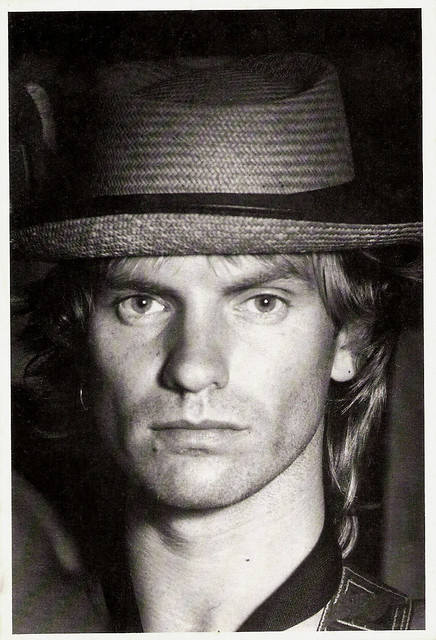
British postcard by Statics, no. PC 8. Photo: Lynn Goldsmith.
The Police
Sting was born Gordon Matthew Thomas Sumner in Wallsend, England, in 1951. He was the eldest of four children born to Audrey Sumner née Cowell, a hairdresser, and Ernest Matthew Sumner, a milkman and engineer. His siblings were Philip, Angela and Anita. Young Gordon would often assist his father with the early-morning milk-delivery rounds, and by age 10 he became ‘obsessed’ with an old Spanish guitar that had been left behind by an emigrating friend of his father. He attended St. Cuthbert's Grammar School in Newcastle upon Tyne. He would often sneak into nightclubs like the Club A Go-Go, where he would watch acts such as Cream and Jimi Hendrix, artists who would later influence his own music.
After jobs as a bus conductor, a construction labourer, and a tax officer, he attended Northern Counties College of Education, (later part of Northumbria University) from 1971 to 1974 and qualified as a teacher. He then worked as a schoolteacher at St. Paul's First School in Cramlington for two years. On evenings, weekends, and during breaks from college and from teaching, Sting performed in local jazz bands, played cruise ships, backed strippers in cabarets, and developed a love for the bass guitar. He gained his nickname when he wore a black and gold rugby shirt during a concert. It made him look like a bee, and prompted the nickname ‘Sting’. The nickname stuck.
In 1977, Sting moved from Newcastle to London, and soon thereafter he joined Stewart Copeland and Henry Padovani (who was soon replaced by Andy Summers) to form the New Wave band The Police. Between 1978 and 1983, they released five chart-topping albums and won six Grammy Awards. Although their initial sound was punk inspired, The Police soon switched to reggae-tinged rock and minimalist pop.
Sting also appeared in some British films. He played Ace Face, the leader of the Mod gang in Quadrophenia (Franc Roddam, 1979) starring Phil Daniels. The film, based on the 1973 rock opera by The Who, tells about the rivalry between the Mods and the Rockers in 1960’s England. Mark Deming at AllMovie calls it “intelligent and incisive bit of teen-centric kitchen-sink drama” and writes about Sting: “Equally memorable (is) Sting, who says practically nothing but radiates waves of icy charisma.” His next film Radio On (Christopher Petit, 1979) is a black and white road movie, featuring music by Kraftwerk and David Bowie. A DJ (David Beames) drives from London to Bristol to investigate the suicide of his brother, and on his way he meets some odd people including Sting.
The pitch-black comedy Brimstone and Treacle (Richard Loncraine, 1982) was based on a television play by Dennis Potter. Sting co-starred as a mysterious young stranger who dramatically changes the lives of a middle-aged middle-class couple (Denholm Elliot and Joan Plowright) in a North London suburb whose daughter has been totally dependent upon them after a catastrophic accident. In 1983, the last album of The Police, Synchronicity, was released. It included their most successful song, Every Breath You Take. The song, which after waking up in the middle of the night from a dream, is officially the most requested radio song of all time. While never formally breaking up, after Synchronicity the group agreed to concentrate on solo projects.
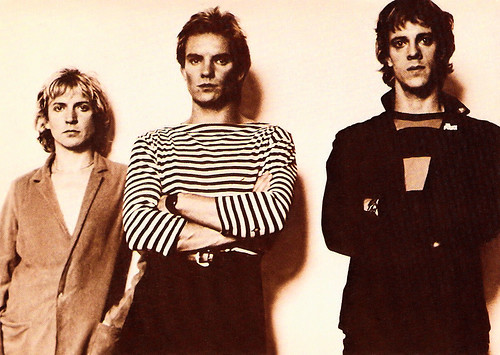
British postcard, no. RC 23650. The Police with Andy Summers (left) and Stewart Copeland (right).
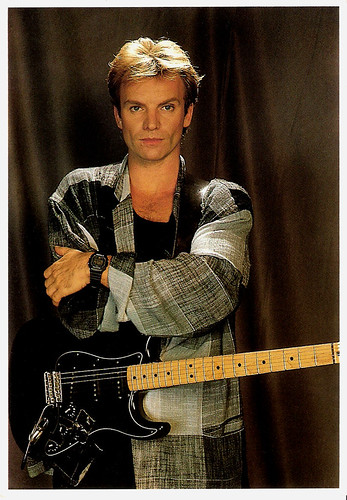
French postcard by Carlton Cards / Santoro Graphics, no. CR33.
Englishman in New York
In 1981, Sting made his first live solo appearance, performing on all four nights of the fourth Amnesty International benefit The Secret Policeman's Other Ball at the invitation of producer Martin Lewis. He performed solo versions of Roxanne and Message in a Bottle. He also led The Secret Police, an all-star band including Eric Clapton, Jeff Beck, Phil Collins, Bob Geldof and Midge Ure on his own arrangement of Bob Dylan's I Shall Be Released. His performances were featured prominently in the album and film of the show and drew critical attention to his work.
Sting's participation in The Secret Policeman's Other Ball was the beginning of his growing involvement in raising money and consciousness for political and social causes. In 1982 he released a solo single, Spread a Little Happiness from the film version of the Dennis Potter television play Brimstone and Treacle. The song was a re-interpretation of a song from the 1920s musical Mr. Cinders by Vivian Ellis, and was a surprise Top 20 hit in the UK.
He also co-starred in the science fiction film Dune (David Lynch, 1984). With a budget of over 40 million dollars, Dune required 80 sets built on 16 sound stages and a total crew of 1700. The film was not well received by critics and performed poorly at the box-office. His following film was The Bride (Franc Roddam, 1985), an adaptation of Mary Shelley's Frankenstein. Sting starred as Baron Charles Frankenstein and Jennifer Beals played a woman he creates in the same fashion as his infamous monster. Both films flopped and damaged Sting’s prospects as a major film star.
A minor success was the Meryl Streep vehicle Plenty (Fred Schepisi, 1985), in which Sting had only a supporting part. His first solo album, The Dream of the Blue Turtles (1985), included the hit singles If You Love Somebody Set Them Free and Russians. The album reached Triple Platinum and would garner Sting a Grammy nomination for Album of the Year. He performed with Dire Straits at the Live Aid Concert at Wembley Stadium. Prior to the Live Aid concert, in November 1984 Sting performed Do They Know It's Christmas? with Band Aid for the relief of poverty in Africa. In 1987, Sting released ...Nothing Like the Sun, including the hit songs Fragile, Englishman in New York, and Be Still My Beating Heart. It eventually went Double Platinum. In 1988, he featured in the role of the soldier on an album of Igor Stravinsky's The Soldier's Tale with the London Sinfonietta conducted by Kent Nagano. It also featured Vanessa Redgrave and Sir Ian McKellen.
On screen he appeared in the atmospheric thriller Stormy Monday (Mike Figgis, 1988), co-starring with Sean Bean, Tommy Lee Jones, and Melanie Griffith. He also co-starred in the Italian drama film Giulia e Giulia/Julia and Julia (Peter Del Monte, 1987) with Kathleen Turner and Gabriel Byrne. This film, presented at the Venice Film Festival in 1987, was the first feature shot using the Sony HDVS wideband analogue High-definition video technique and then transferred to 35 mm film.
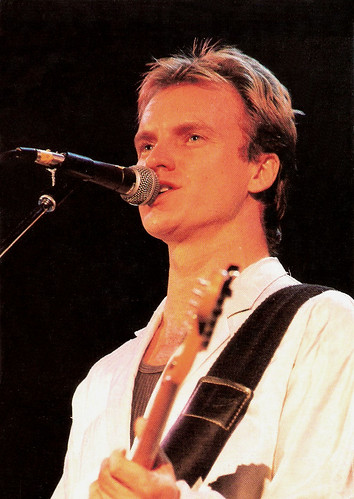
French postcard by Media Com +, no. G. 2. Photo: Ed. Gil.
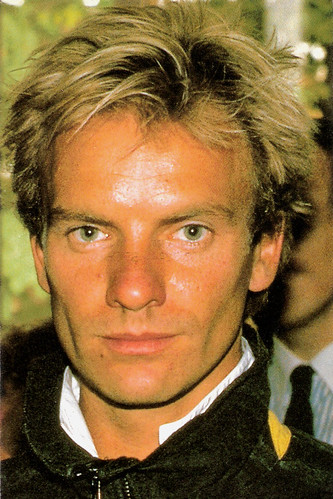
British postcard by Heroes, London, no. SPC618.

American postcard by Coral-Lee, Rancho Cordova, CA., Personality #131.
Bisexual Butler
Sting’s 1991 album The Soul Cages included the Top 10 song All This Time, and the Grammy-winning The Soul Cages. The album eventually went Platinum. The following year, he married film producer Trudie Styler. In 1993, he released the album Ten Summoner's Tales, which peaked at number two in the UK and US Album Charts, and went triple platinum in just over a year. A hit single on the album was If I Ever Lose My Faith in You, which earned Sting his second Grammy Award. In 1993, he released a cover of his own Police song Demolition Man from the Ghost in the Machine album for the film Demolition Man (Marco Brambilla, 1993).
Together with Bryan Adams and Rod Stewart, Sting performed the chart-topping song All for Love for the film The Three Musketeers (Stephen Herek, 1993). The song stayed at the top of the US charts for five weeks and went Platinum. In 1995 he played a bisexual butler in the British film The Grotesque (John-Paul Davidson, 1995) with Alan Bates, Lena Headey and Theresa Russell. His nude scenes were the highlights of that film, according to an IMDb reviewer. His 1996 album, Mercury Falling debuted strongly with the single Let Your Soul Be Your Pilot, but it dropped quickly on the charts.
Sting was also recording music for the upcoming Disney film Kingdom of the Sun, which went on to be reworked into The Emperor's New Groove (Mark Dindal, 2000). The film went through drastic overhauls and plot changes, many of which were documented by his wife, Trudie Styler. She captured the moment he was called by Disney who then informed him that his songs would not be used in the final film. The story was put into a final product: The Sweatbox, which premiered at the Toronto Film Festival. Disney currently holds the rights to the film and will not grant its release.
More successful was his work on the British crime film Lock, Stock and Two Smoking Barrels (Guy Ritchie, 1998). He played the father of a self-confident young card sharp (Nick Moran) who loses half a million pounds to a powerful crime lord in a card game. He and his friends have one week to come up with the cash. Laura Abraham at AllMovie: “a work of artistic originality as well as an accurate portrayal of life as an Eastender. A rabid, farcical look at gangsters in East End London, it contains mayhem at the center of every scene and gains additional intensity from the slow-motion technique Ritchie employs in many of his death sequences.” The film brought Guy Ritchie international acclaim and introduced former footballer Vinnie Jones, and former street merchant Jason Statham to worldwide cinema audiences.
In 1999, Sting’s album Brand New Day included the Top 40 hits Brand New Day and Desert Rose. The album went Triple Platinum and won two Grammy Awards.
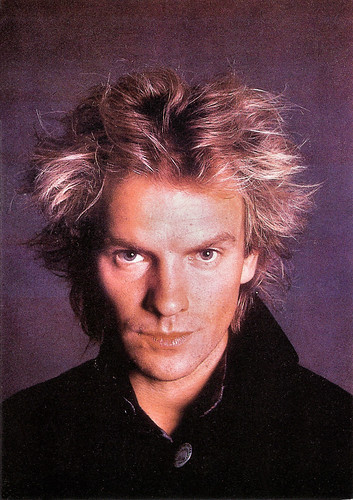
French postcard by Image Media, no. 80 bis.
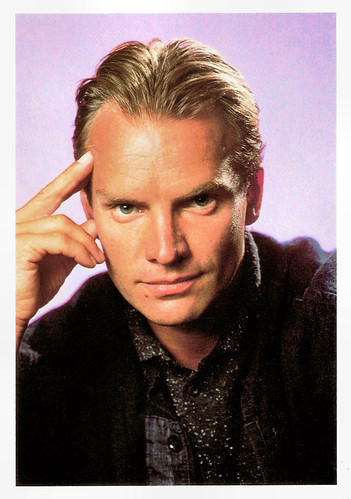
French postcard by Peutsch, no. 964.
Broken Music
In 2002 Sting won a Golden Globe Award for his song Until... from the film Kate and Leopold (James Mangold, 2001). It was also nominated for Academy Award for Best Song. At the 2002 Brit Awards, he received the prize for Outstanding Contribution to Music. Later that year he was inducted into the Songwriters Hall of Fame, was awarded the CBE (Commander of the Order of the British Empire), and won an Emmy Award for his A&E special, Sting in Tuscany... All This Time.
In 2003 he released Sacred Love. He and Mary J. Blige won a Grammy for their album duet, Whenever I Say Your Name. The album did not have the hit singles like his previous releases. However, the album did reach platinum status. His autobiography Broken Music (2003) was published in October. In 2006, he released an album, to mixed reviews, entitled Songs from the Labyrinth featuring the music of English Renaissance composer John Dowland and accompaniment from Bosnian lute player Edin Karamazov.
In 2007, he reunited with the other members of The Police as the introductory act for the 2007 Grammy Awards, singing Roxanne. Subsequently they announced The Police Reunion Tour. The Police toured for more than a year, beginning with North America and eventually crossing over to Europe, South America, Australia & New Zealand and Japan. The last concert was at Madison Square Garden on 7 August 2008, during which his three daughters appeared with him onstage. In 2009 he released a new solo album If on a Winter's Night...
In the cinema he was seen in several film as himself. He had a cameos in the mockumentaries Brüno (Larry Charles, 2009) starring Sacha Baron Cohen as the gay Austrian fashion journalist Brüno, and Do It Again (Robert Patton-Spruill, 2010) which follows Boston Globe reporter Geoff Edgers on his quest to reunite British rock band The Kinks. He also gave his voice to the animation feature Bee Movie (Steve Hickner, Simon J. Smith, 2007).
During his career Sting has received 16 Grammy Awards, three Brit Awards, a Golden Globe, an Emmy Award, and several Oscar nominations for Best Original Song. Sting was married twice, first to actress Frances Tomelty and since 1992 to Trudie Styler. He has six children, two with Tomelty (singer Joseph Sumner (1976) and actress Fuschia Sumner (1982) and four with Styler (Mickey Sumner (1984), Jake Sumner (1985), Coco Sumner (1990) and Giacomo Sumner (1995). Sting owns a Jacobian castle in Wiltshire, a place in London, an apartment in New York, a house on the beach in Malibu, California, and a Renaissance Florentine Villa in Tuscany, Italy.
Trailer Brimstone and Treacle (Richard Loncraine, 1982). Source: MinervaPicturesGroup (YouTube).
Scene from The Grotesque (John-Paul Davidson, 1995) with Alan Bates and Steven Mackintosh. Source: Elena Gribkova (YouTube).
Trailer Lock, Stock and Two Smoking Barrels (Guy Ritchie, 1998). Source: thecultbox (YouTube).
Sources: Hal Erickson (AllMovie), Mark Deming (AllMovie), Laura Abraham (AllMovie), Dan Fineberg (IMDb), Wikipedia and IMDb.

British postcard by Statics, no. PC 8. Photo: Lynn Goldsmith.
The Police
Sting was born Gordon Matthew Thomas Sumner in Wallsend, England, in 1951. He was the eldest of four children born to Audrey Sumner née Cowell, a hairdresser, and Ernest Matthew Sumner, a milkman and engineer. His siblings were Philip, Angela and Anita. Young Gordon would often assist his father with the early-morning milk-delivery rounds, and by age 10 he became ‘obsessed’ with an old Spanish guitar that had been left behind by an emigrating friend of his father. He attended St. Cuthbert's Grammar School in Newcastle upon Tyne. He would often sneak into nightclubs like the Club A Go-Go, where he would watch acts such as Cream and Jimi Hendrix, artists who would later influence his own music.
After jobs as a bus conductor, a construction labourer, and a tax officer, he attended Northern Counties College of Education, (later part of Northumbria University) from 1971 to 1974 and qualified as a teacher. He then worked as a schoolteacher at St. Paul's First School in Cramlington for two years. On evenings, weekends, and during breaks from college and from teaching, Sting performed in local jazz bands, played cruise ships, backed strippers in cabarets, and developed a love for the bass guitar. He gained his nickname when he wore a black and gold rugby shirt during a concert. It made him look like a bee, and prompted the nickname ‘Sting’. The nickname stuck.
In 1977, Sting moved from Newcastle to London, and soon thereafter he joined Stewart Copeland and Henry Padovani (who was soon replaced by Andy Summers) to form the New Wave band The Police. Between 1978 and 1983, they released five chart-topping albums and won six Grammy Awards. Although their initial sound was punk inspired, The Police soon switched to reggae-tinged rock and minimalist pop.
Sting also appeared in some British films. He played Ace Face, the leader of the Mod gang in Quadrophenia (Franc Roddam, 1979) starring Phil Daniels. The film, based on the 1973 rock opera by The Who, tells about the rivalry between the Mods and the Rockers in 1960’s England. Mark Deming at AllMovie calls it “intelligent and incisive bit of teen-centric kitchen-sink drama” and writes about Sting: “Equally memorable (is) Sting, who says practically nothing but radiates waves of icy charisma.” His next film Radio On (Christopher Petit, 1979) is a black and white road movie, featuring music by Kraftwerk and David Bowie. A DJ (David Beames) drives from London to Bristol to investigate the suicide of his brother, and on his way he meets some odd people including Sting.
The pitch-black comedy Brimstone and Treacle (Richard Loncraine, 1982) was based on a television play by Dennis Potter. Sting co-starred as a mysterious young stranger who dramatically changes the lives of a middle-aged middle-class couple (Denholm Elliot and Joan Plowright) in a North London suburb whose daughter has been totally dependent upon them after a catastrophic accident. In 1983, the last album of The Police, Synchronicity, was released. It included their most successful song, Every Breath You Take. The song, which after waking up in the middle of the night from a dream, is officially the most requested radio song of all time. While never formally breaking up, after Synchronicity the group agreed to concentrate on solo projects.

British postcard, no. RC 23650. The Police with Andy Summers (left) and Stewart Copeland (right).

French postcard by Carlton Cards / Santoro Graphics, no. CR33.
Englishman in New York
In 1981, Sting made his first live solo appearance, performing on all four nights of the fourth Amnesty International benefit The Secret Policeman's Other Ball at the invitation of producer Martin Lewis. He performed solo versions of Roxanne and Message in a Bottle. He also led The Secret Police, an all-star band including Eric Clapton, Jeff Beck, Phil Collins, Bob Geldof and Midge Ure on his own arrangement of Bob Dylan's I Shall Be Released. His performances were featured prominently in the album and film of the show and drew critical attention to his work.
Sting's participation in The Secret Policeman's Other Ball was the beginning of his growing involvement in raising money and consciousness for political and social causes. In 1982 he released a solo single, Spread a Little Happiness from the film version of the Dennis Potter television play Brimstone and Treacle. The song was a re-interpretation of a song from the 1920s musical Mr. Cinders by Vivian Ellis, and was a surprise Top 20 hit in the UK.
He also co-starred in the science fiction film Dune (David Lynch, 1984). With a budget of over 40 million dollars, Dune required 80 sets built on 16 sound stages and a total crew of 1700. The film was not well received by critics and performed poorly at the box-office. His following film was The Bride (Franc Roddam, 1985), an adaptation of Mary Shelley's Frankenstein. Sting starred as Baron Charles Frankenstein and Jennifer Beals played a woman he creates in the same fashion as his infamous monster. Both films flopped and damaged Sting’s prospects as a major film star.
A minor success was the Meryl Streep vehicle Plenty (Fred Schepisi, 1985), in which Sting had only a supporting part. His first solo album, The Dream of the Blue Turtles (1985), included the hit singles If You Love Somebody Set Them Free and Russians. The album reached Triple Platinum and would garner Sting a Grammy nomination for Album of the Year. He performed with Dire Straits at the Live Aid Concert at Wembley Stadium. Prior to the Live Aid concert, in November 1984 Sting performed Do They Know It's Christmas? with Band Aid for the relief of poverty in Africa. In 1987, Sting released ...Nothing Like the Sun, including the hit songs Fragile, Englishman in New York, and Be Still My Beating Heart. It eventually went Double Platinum. In 1988, he featured in the role of the soldier on an album of Igor Stravinsky's The Soldier's Tale with the London Sinfonietta conducted by Kent Nagano. It also featured Vanessa Redgrave and Sir Ian McKellen.
On screen he appeared in the atmospheric thriller Stormy Monday (Mike Figgis, 1988), co-starring with Sean Bean, Tommy Lee Jones, and Melanie Griffith. He also co-starred in the Italian drama film Giulia e Giulia/Julia and Julia (Peter Del Monte, 1987) with Kathleen Turner and Gabriel Byrne. This film, presented at the Venice Film Festival in 1987, was the first feature shot using the Sony HDVS wideband analogue High-definition video technique and then transferred to 35 mm film.

French postcard by Media Com +, no. G. 2. Photo: Ed. Gil.

British postcard by Heroes, London, no. SPC618.

American postcard by Coral-Lee, Rancho Cordova, CA., Personality #131.
Bisexual Butler
Sting’s 1991 album The Soul Cages included the Top 10 song All This Time, and the Grammy-winning The Soul Cages. The album eventually went Platinum. The following year, he married film producer Trudie Styler. In 1993, he released the album Ten Summoner's Tales, which peaked at number two in the UK and US Album Charts, and went triple platinum in just over a year. A hit single on the album was If I Ever Lose My Faith in You, which earned Sting his second Grammy Award. In 1993, he released a cover of his own Police song Demolition Man from the Ghost in the Machine album for the film Demolition Man (Marco Brambilla, 1993).
Together with Bryan Adams and Rod Stewart, Sting performed the chart-topping song All for Love for the film The Three Musketeers (Stephen Herek, 1993). The song stayed at the top of the US charts for five weeks and went Platinum. In 1995 he played a bisexual butler in the British film The Grotesque (John-Paul Davidson, 1995) with Alan Bates, Lena Headey and Theresa Russell. His nude scenes were the highlights of that film, according to an IMDb reviewer. His 1996 album, Mercury Falling debuted strongly with the single Let Your Soul Be Your Pilot, but it dropped quickly on the charts.
Sting was also recording music for the upcoming Disney film Kingdom of the Sun, which went on to be reworked into The Emperor's New Groove (Mark Dindal, 2000). The film went through drastic overhauls and plot changes, many of which were documented by his wife, Trudie Styler. She captured the moment he was called by Disney who then informed him that his songs would not be used in the final film. The story was put into a final product: The Sweatbox, which premiered at the Toronto Film Festival. Disney currently holds the rights to the film and will not grant its release.
More successful was his work on the British crime film Lock, Stock and Two Smoking Barrels (Guy Ritchie, 1998). He played the father of a self-confident young card sharp (Nick Moran) who loses half a million pounds to a powerful crime lord in a card game. He and his friends have one week to come up with the cash. Laura Abraham at AllMovie: “a work of artistic originality as well as an accurate portrayal of life as an Eastender. A rabid, farcical look at gangsters in East End London, it contains mayhem at the center of every scene and gains additional intensity from the slow-motion technique Ritchie employs in many of his death sequences.” The film brought Guy Ritchie international acclaim and introduced former footballer Vinnie Jones, and former street merchant Jason Statham to worldwide cinema audiences.
In 1999, Sting’s album Brand New Day included the Top 40 hits Brand New Day and Desert Rose. The album went Triple Platinum and won two Grammy Awards.

French postcard by Image Media, no. 80 bis.

French postcard by Peutsch, no. 964.
Broken Music
In 2002 Sting won a Golden Globe Award for his song Until... from the film Kate and Leopold (James Mangold, 2001). It was also nominated for Academy Award for Best Song. At the 2002 Brit Awards, he received the prize for Outstanding Contribution to Music. Later that year he was inducted into the Songwriters Hall of Fame, was awarded the CBE (Commander of the Order of the British Empire), and won an Emmy Award for his A&E special, Sting in Tuscany... All This Time.
In 2003 he released Sacred Love. He and Mary J. Blige won a Grammy for their album duet, Whenever I Say Your Name. The album did not have the hit singles like his previous releases. However, the album did reach platinum status. His autobiography Broken Music (2003) was published in October. In 2006, he released an album, to mixed reviews, entitled Songs from the Labyrinth featuring the music of English Renaissance composer John Dowland and accompaniment from Bosnian lute player Edin Karamazov.
In 2007, he reunited with the other members of The Police as the introductory act for the 2007 Grammy Awards, singing Roxanne. Subsequently they announced The Police Reunion Tour. The Police toured for more than a year, beginning with North America and eventually crossing over to Europe, South America, Australia & New Zealand and Japan. The last concert was at Madison Square Garden on 7 August 2008, during which his three daughters appeared with him onstage. In 2009 he released a new solo album If on a Winter's Night...
In the cinema he was seen in several film as himself. He had a cameos in the mockumentaries Brüno (Larry Charles, 2009) starring Sacha Baron Cohen as the gay Austrian fashion journalist Brüno, and Do It Again (Robert Patton-Spruill, 2010) which follows Boston Globe reporter Geoff Edgers on his quest to reunite British rock band The Kinks. He also gave his voice to the animation feature Bee Movie (Steve Hickner, Simon J. Smith, 2007).
During his career Sting has received 16 Grammy Awards, three Brit Awards, a Golden Globe, an Emmy Award, and several Oscar nominations for Best Original Song. Sting was married twice, first to actress Frances Tomelty and since 1992 to Trudie Styler. He has six children, two with Tomelty (singer Joseph Sumner (1976) and actress Fuschia Sumner (1982) and four with Styler (Mickey Sumner (1984), Jake Sumner (1985), Coco Sumner (1990) and Giacomo Sumner (1995). Sting owns a Jacobian castle in Wiltshire, a place in London, an apartment in New York, a house on the beach in Malibu, California, and a Renaissance Florentine Villa in Tuscany, Italy.
Trailer Brimstone and Treacle (Richard Loncraine, 1982). Source: MinervaPicturesGroup (YouTube).
Scene from The Grotesque (John-Paul Davidson, 1995) with Alan Bates and Steven Mackintosh. Source: Elena Gribkova (YouTube).
Trailer Lock, Stock and Two Smoking Barrels (Guy Ritchie, 1998). Source: thecultbox (YouTube).
Sources: Hal Erickson (AllMovie), Mark Deming (AllMovie), Laura Abraham (AllMovie), Dan Fineberg (IMDb), Wikipedia and IMDb.
No comments:
Post a Comment